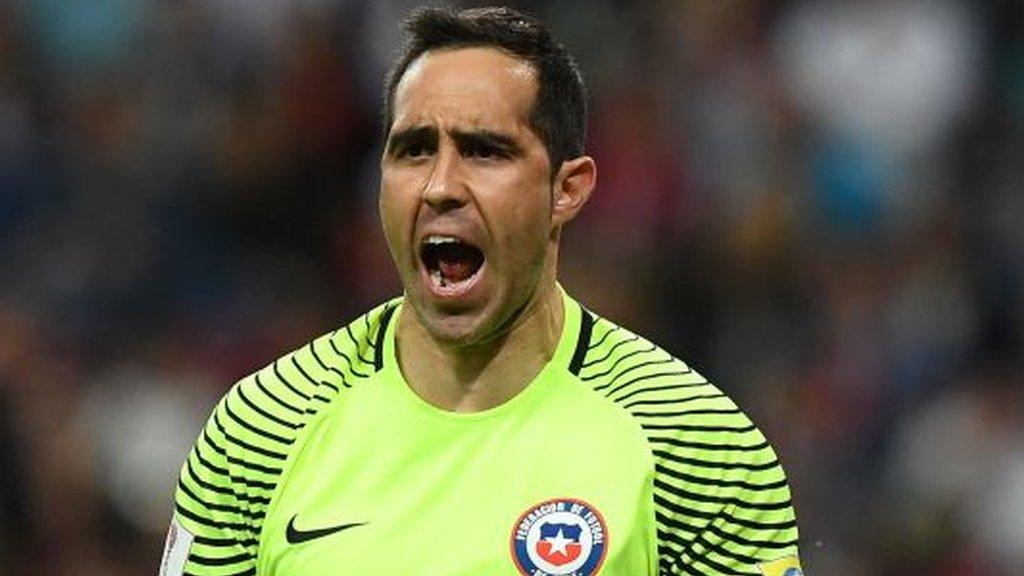Confederations Cup 2017: VAR confusion, Russian hospitality & Ronaldo complaints
- Published
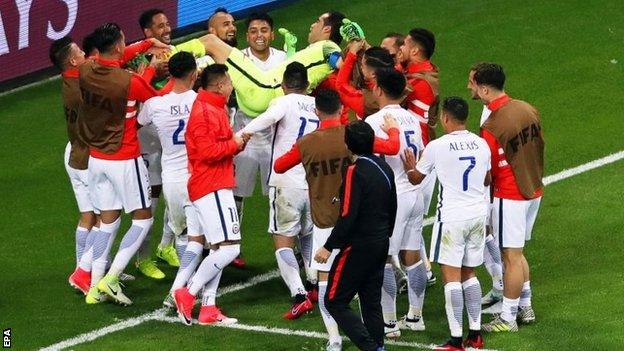
Claudio Bravo's penalty saves have taken Chile to the final
The Confederations Cup is acting as a warm-up for next summer's World Cup in Russia. So what have we learned?
There have been plenty of teething issues with the video assistant referee (VAR) system, criticism of pitches, and hosts Russia do not look in great shape on the field.
But - despite pre-tournament fears - there have been no reported incidents of racism, the atmosphere around the tournament has been good - and there has been some pretty decent football, with Germany and Chile reaching Sunday's final (19:00 BST).
Here we look at the major talking points from the tournament, and what pointers we can take for next summer's World Cup.
To VAR or not to VAR?
Confusion. So much confusion. The video referees that so many managers, fans and pundits have called for have been trialled in Russia.
But plenty of issues have arisen. In the group stages, six "game-changing decisions" were made using VAR, with another 29 "major incidents" - according to Fifa's head referee Massimo Busacca. That's 35 in 12 games. Interestingly, though, it appeared not to be used in either semi-final.
Referees can decide whether they want help from the VAR, although other officials, including the video ones, can suggest he uses the technology. If he does, he has the choice of trusting the VAR's decision or viewing the footage himself on a screen on the side of the pitch.
However, fans cannot hear any of the conversations or see on a screen what the referee is watching - meaning several long delays while nobody on the pitch, on the sidelines, in the stands, or watching on TV, knows exactly what is happening.
There was controversy in Chile's semi-final win, when Portugal defender Jose Fonte appeared to foul Francisco Silva in the box, but the referee did not award a penalty - or ask to see the incident again.
In the group game between Germany and Cameroon, the wrong player - Sebastien Siani - was booked in a case of mistaken identity. After referee Wilmar Roldan used the VAR, he upgraded Siani's yellow card to a red. But, after watching the video a second time, he saw Ernest Mabouka had actually committed the foul and sent him off instead.
While all this was happening, everyone else was in the dark. Cameroon boss Hugo Broos said afterwards: "I didn't understand it and I still don't understand it now."
Fifa president Gianni Infantino says the system has been a "great success", but that work is needed on "the details" such as the speed of decisions.
"Without the VAR, we would have had a different tournament and it would have been a little less fair," he added. "Thanks to VAR we have achieved a great thing. Those big mistakes will not happen any longer.
"It will always be the referee who decides and there will always be discussions, but big mistakes will be corrected and that is a great achievement after it was asked for for so many years."
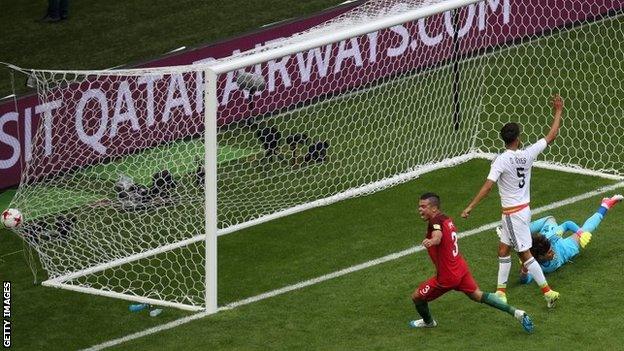
Pepe thought he had given Portugal the lead in their opening game with Mexico, but the referee ruled it out correctly for offside after consulting with the VAR
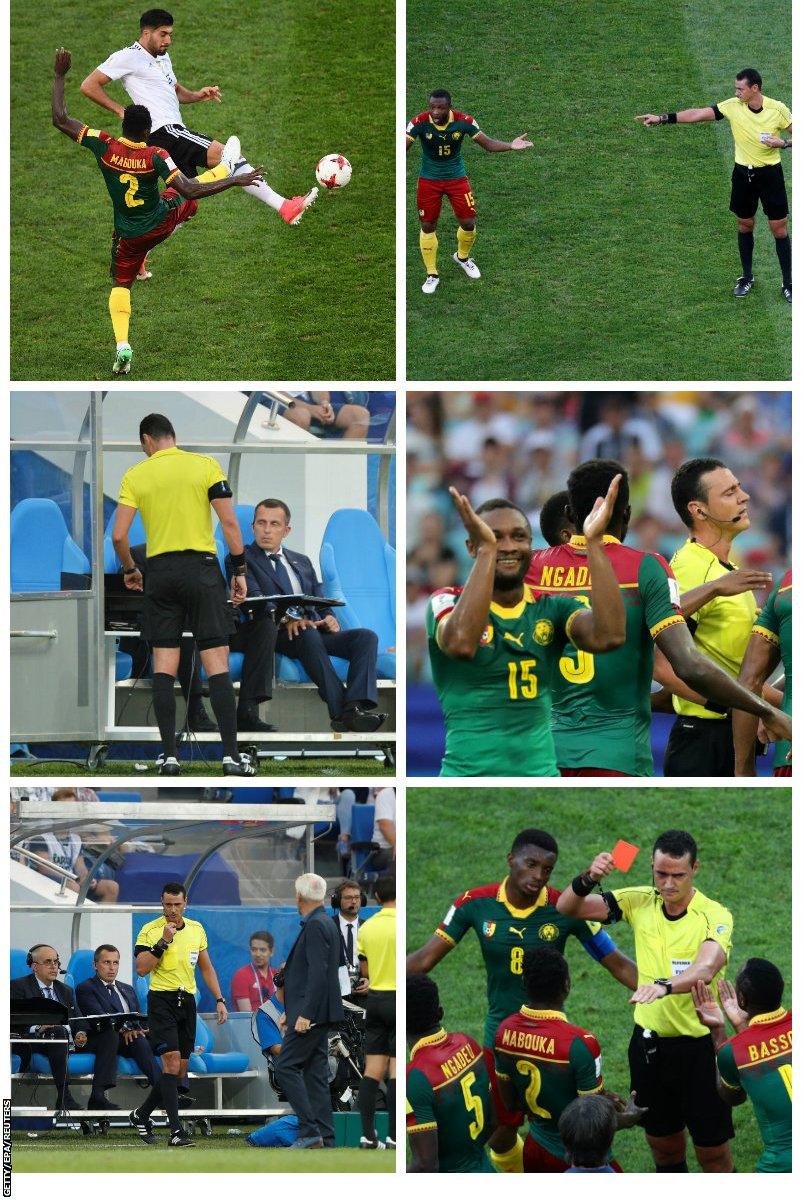
How the Cameroon v Germany incident unfolded... (1) Ernest Mabouka fouls Emre Can. (2) A stunned Sebastien Siani is shown a yellow card. (3) Wilmar Roldan consults the VAR. (4) He comes back on and shows a red card to Siani, who applauds sarcastically as players surround the referee. (5) Roldan again goes to the VAR. (6) The referee comes on and this time sends off Mabouka - more than three minutes after he fouled Can
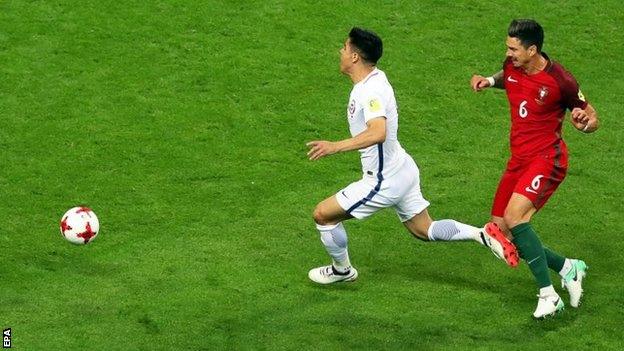
Chile had a strong penalty appeal when Jose Fonte appeared to foul Francisco Silva in extra time during their semi-final, but the referee did not even appear to consult VAR
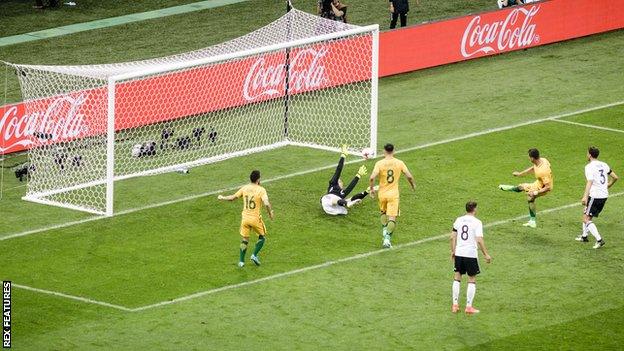
Tomi Juric appeared to handle the ball in the build-up to his goal for Australia against Germany - but it was allowed to stand after VAR consultation
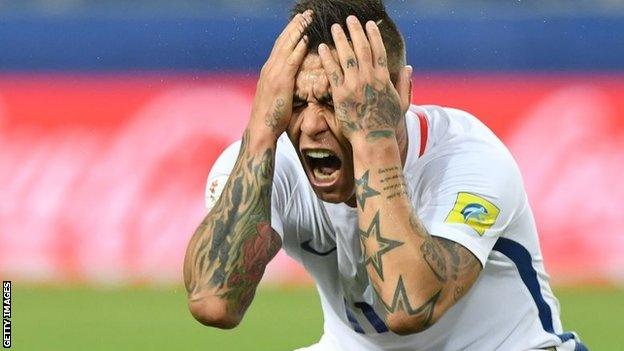
Chile's Eduardo Vargas had a goal ruled out - for a marginal, but correct offside decision - against Cameroon. He later scored a goal in the same game - which again went to VAR, but this time it was allowed
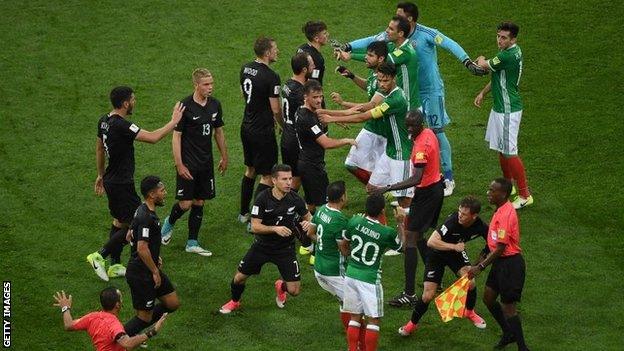
There was a long delay in Mexico v New Zealand when the referee had to stop a melee. After calming things down, he had to go to the sidelines to watch what had happened before booking one player. A free-kick was taken but then the referee stopped play again to book another two players
So, is there a future for video referees?
Referees' chief Busacca admits "many aspects should be improved" in the VAR system.
"Every referee team in every country that is supplying officials to the World Cup needs to be working with VAR every day," he said.
"In five days we did the VAR training for this competition. To implement more, to be at the level we need, we need time."
BBC World Service's Mani Djazmi has been at the tournament. He said: "The great fear among those sceptical about video technology was that it would remove talking points from football.
"In fact, so far, the opposite has happened.
"Busacca, who officiated in two World Cups, told me referees at the Confed Cup aren't 100% clear on VAR. So what hope have fans in the stadium?
"Spectators have often been left twiddling their thumbs as the minutes tick by while private conversations take place and decisions are reached, albeit ones that have corrected refereeing errors.
"Busacca says they will aim to show replays inside stadia, but only from the decisive angle. He was much less committal about letting us in on the conversations between the VAR and the referee.
"But the point of the Confed Cup is to try stuff out. It will be interesting to see if VAR will be missed when the English season kicks off without its beady eye."
After the first four matches, Fifa president Gianni Infantino said: "I am extremely happy with VAR so far. We have seen how video assistance has helped referees to make the correct decisions.
"This is what VAR is all about. The VAR tests during this Confederations Cup are also helping us to improve the processes and fine-tune communication. What fans have been waiting for over so many years is finally happening. This is a milestone tournament. Video assistant refereeing is the future of modern football."
Former New Zealand striker Wynton Rufer is a member of Fifa's technical study group at the Confederations Cup. He told BBC World Service's World Football Show: "It's another area where Fifa are trying to improve but it will take some time. So we need patience.
"I think one of the four VARs should be an ex-player. It's a new situation that we've got to get used to. It works well in rugby. Perhaps in the future they will put it on a screen."
Former Everton midfielder Leon Osman, speaking on BBC Radio 5 live's Monday Night Club, said: "You can't blame the referees at all [for referring to VAR], because if they don't look up what the players are claiming and it turns out it did happen then they're going to get in an awful lot of trouble.
"The problem you've now got is players will claim for absolutely anything, any reason to review the goal and have a look. It's going to cut down the amount of goals being scored, because every time a goal goes in, it will get reviewed.
"There will be 10, 15, 20% of goals that they find a tiny reason why they should rule them out. It frustrates me already. I dislike it completely.
"There will be teething problems but it's on the way to becoming part of football and I just can't see it being stopped."
What has it been like to be in Russia?
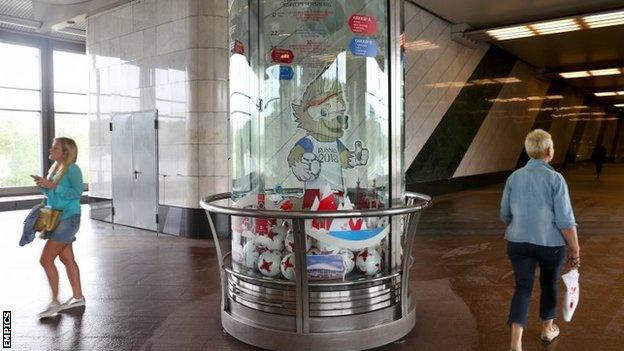
Signs for next summer's World Cup are already on show in metro stations
BBC reporter Mani Djazmi said: "In terms of organisation, the Confederations Cup has been well run and, especially in Moscow, well received.
"There, the metro trains are regular and fast, and the confluence of fans has created a genuine festival atmosphere.
"The organisers have provided free train travel for fans with tickets and will do so again for the World Cup.
"If you're going from places that aren't too far apart, I'd definitely recommend the train.
"Airport security is tight, repetitive and time-consuming.
"Stadium security is even tighter, so always leave more time than you think you'll need.
"Of course, the Confed Cup is nothing like the World Cup. Four times as many teams will be here next year, and many more hundreds of thousands of fans, which will be the real test of the infrastructure.
"I went to a fan zone in Sochi for Wednesday's first semi-final, except it wasn't a fan zone as it was cancelled on the day of the game in favour of a cultural festival. I don't sense a great passion for football in Sochi.
"But based on this tournament, the atmosphere will be friendly, helpful and relaxed.
"Oh, and bring a kettle, because some of my hotels haven't had one in the rooms."
Will there be problems with the pitches?
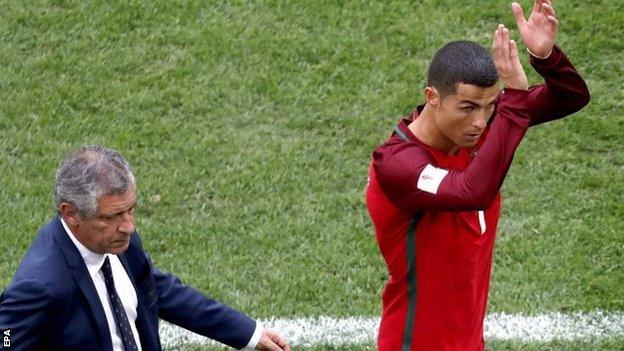
Was the grass too long at the St Petersburg Stadium? Cristiano Ronaldo thought so
The St Petersburg Stadium is having to be treated before Sunday's final. The pitch had to be relaid after it was cut up following the first match there in April.
Portugal captain Cristiano Ronaldo and coach Fernando Santos both criticised the pitch after their 4-0 win over New Zealand last Saturday. Ronaldo said the grass was too long, while Santos said his team were not allowed to train on it before the game.
Fifa director of competitions Colin Smith said greenhouse structures had been installed over the pitch's weaker areas and added: "We're confident that it will be a good playing surface for the final."
Has there been any racism? Is doping 'false news'?
'We don't see doping as a problem in football' - 2018 World Cup chief Sorokin
One of the major concerns about Russia hosting the World Cup has been a history of racism from fans in the country. But there does not seem to have been any instances of racism or other forms of discrimination - or hooliganism - so far during the Confederations Cup.
Djazmi said: "The question of racism has long haunted the build-up to the 2018 World Cup.
"Brazil forward Hulk, regarded by many observers here as the best foreign talent to play in Russia, is the most high-profile example of a player who was abused by fans.
"But Russian football has always been unequivocal in its response to questions about racism: 'It happens here, like it happens everywhere'.
"But they would say that, wouldn't they?
"Anton Elemoso is a half-Russian, half-Nigerian professional, who lives in Moscow.
"'I wouldn't say there's a massive abuse of black players,' he told me.
"'There are unfortunate incidents when a banana gets thrown, but just like there are unfortunate incidents in Italy or Spain, where players like Mario Balotelli and Dani Alves get abused.
"'I wouldn't say that Russians are racist by nature. The image that Russia gets is too elaborate.
"'A lot of change has happened in the last 20 years. People started to travel, they had more money, and access to English-language content like movies.
"'Russian society's moved a long way from what it was in the '90s.'"
Fifa confirmed last weekend that it was investigating whether Russian players - including the 2014 World Cup squad - benefited from the state-sponsored doping programme outlined by the McLaren report in 2016.
But Alexey Sorokin - the 2018 World Cup chief - said Russian football does not have a doping problem, and claims suggesting otherwise are "made-up news".
"We don't consider this to be a serious matter and it's very strange that it's in the papers," he said.
Are Russia going to flop on the pitch?
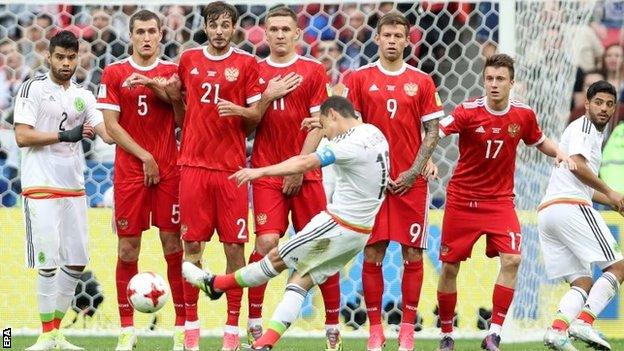
Russia beat New Zealand in the opening game, but then lost to Portugal and Mexico - the two beaten semi-finalists
Most neutrals agree the atmosphere around a tournament depends on the hosts having a decent run. But there is a real chance Russia's interest in the World Cup may be short-lived next year.
The Confederations Cup hosts went out in the group stages - just as they did at Euro 2012 and 2016, and the 2014 World Cup.
There is little to indicate things will improve next year.
"We won't have new players tomorrow. This is our main team," Deputy Prime Minister Vitaly Mutko, who also heads the Russian Football Union, said last week. "Aliens aren't going to fly in to play for Russia."
Their entire squad play in Russia, and former USSR international and commentator Yevgeny Lovchev said: "Our domestic championship does not produce good enough players for us to even think we can contend for anything."
Ex-FC Zurich forward Rufer told BBC Sport: "We all really wanted Russia to go through - you want to be in a stadium with supporters cheering their team on.
"Every time they got the ball, the crowd just lifted. But the team were a bit disappointing. A lot of the players were very nervous. They couldn't deliver."
How has the tournament been in general?
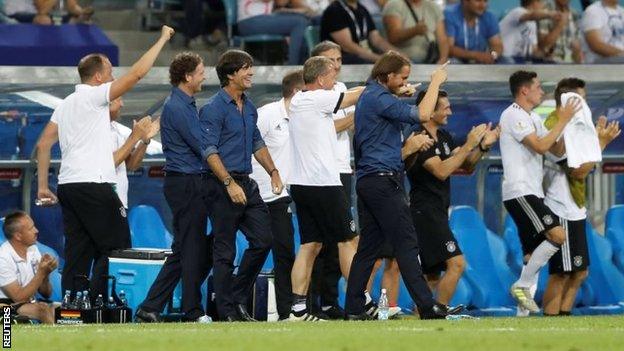
Joachim Low has led Germany to a third final in his reign. They won the 2014 World Cup after losing the Euro 2008 final
Germany brought a youthful squad to Russia, with stars Manuel Neuer, Jerome Boateng, Mesut Ozil, Toni Kroos and Thomas Muller all left at home. Five of the starting line-up in their 4-1 semi-final win over Mexico would have been eligible for the European Under-21 Championship.
But reserve team or not, they have reached the final in impressive fashion, scoring three goals twice in the group stages before exceeding that tally against Mexico. Leon Goretzka, who scored twice in the semi-final, and Timo Werner are the tournament's top scorers on three each.
Chile have joined them in the final, despite winning only one game in open play. Having drawn two of their three group games, they drew 0-0 with Portugal before winning 3-0 on penalties in their semi-final.
Rufer, a former Werder Bremen player, said: "Claudio Bravo was unbelievable in the penalty shootout. Chile have a winning mentality and great team spirit.
"Fifa were disappointed that Germany's big guns weren't coming. Jogi Low picked young players and didn't expect much from them but they delivered. It's phenomenal, the range of players they have."
Ronaldo - who scored twice in the tournament - will not play in Portugal's third-fourth play-off against Mexico on Sunday as he has flown home to meet his newborn twins.
- Published29 June 2017
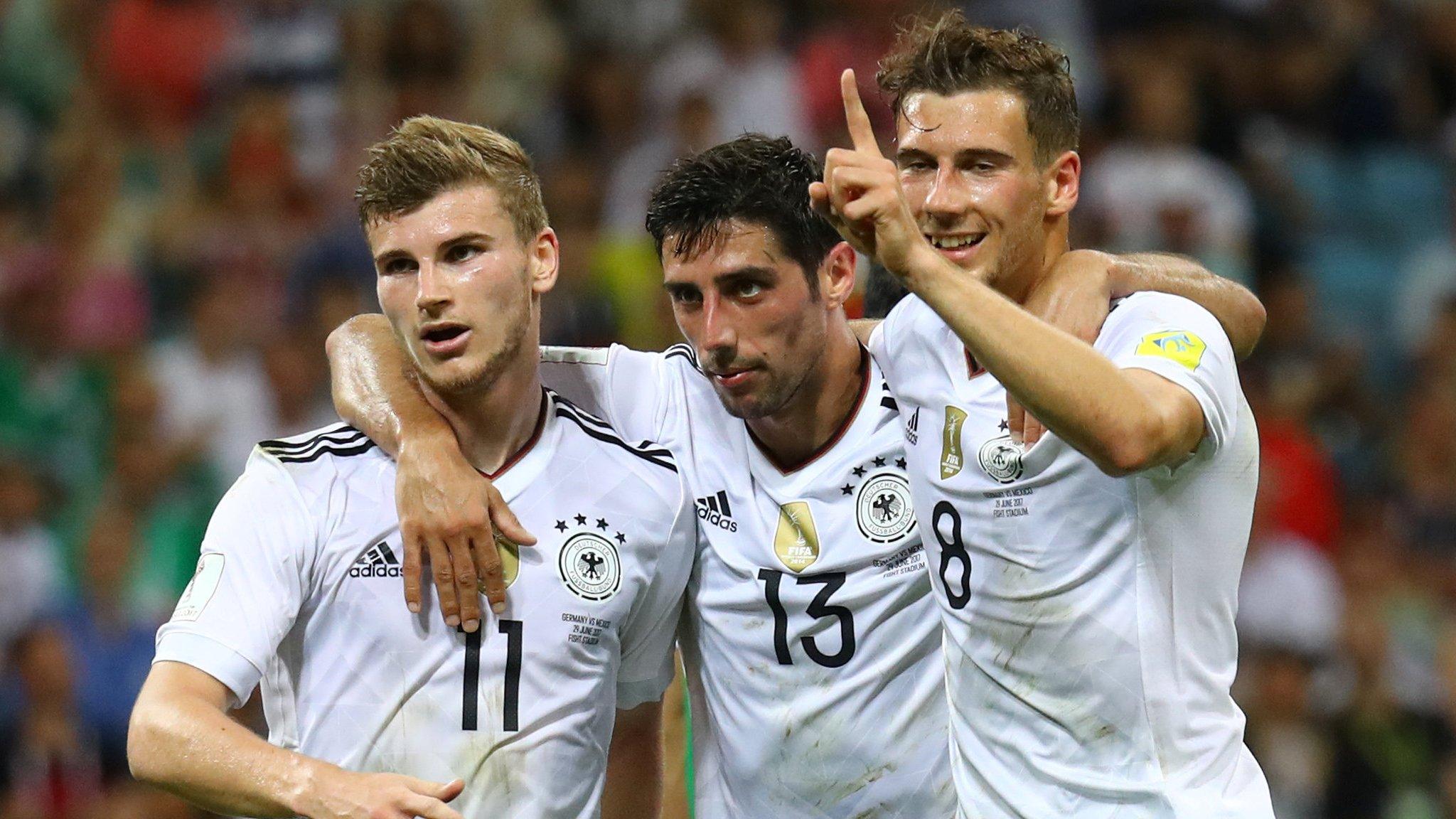
- Published28 June 2017
